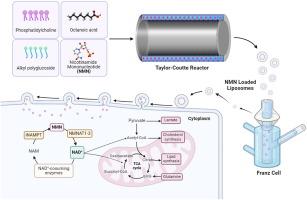Production of liposome loaded with nicotinamide mononucleotide using taylor-couette reactor
IF 13.3
1区 工程技术
Q1 ENGINEERING, CHEMICAL
引用次数: 0
Abstract
Nicotinamide mononucleotide (NMN) is recognized for its potential in resisting age-related diseases, metabolic disorders, and neurodegenerative conditions. However, challenges persevere in ensuring NMN’s stability, bioavailability, and efficient delivery to target tissues. This study targeted to overcome these challenges by preparing NMN-loaded liposomes using a Taylor-Couette reactor, a novel approach offering precise control over flow conditions and enhancing reproducibility and scalability. The average size of liposomes decreased from 184.9 nm to 125.2 nm as the rotation speed increased from 600 to 1500 rpm. Based on average zeta potential values, stable liposomes were prepared at 750–1500 rpm. These liposomes were preserved more than 80 % for 180 days. Ex vivo tests using Franz cell diffusion confirmed the efficiency of NMN-loaded liposomes in permeating the skin. The cumulative release percentage of liposomes over porcine skin was 96.8 % in 12 h. Overall, this study proposes valuable intuitions into the preparation and depiction of NMN-loaded liposomes using novel approaches, offering auspicious prospects for biomedical applications.

利用泰勒-库埃特反应器生产负载有烟酰胺单核苷酸的脂质体
本文章由计算机程序翻译,如有差异,请以英文原文为准。
求助全文
约1分钟内获得全文
求助全文
来源期刊

Chemical Engineering Journal
工程技术-工程:化工
CiteScore
21.70
自引率
9.30%
发文量
6781
审稿时长
2.4 months
期刊介绍:
The Chemical Engineering Journal is an international research journal that invites contributions of original and novel fundamental research. It aims to provide an international platform for presenting original fundamental research, interpretative reviews, and discussions on new developments in chemical engineering. The journal welcomes papers that describe novel theory and its practical application, as well as those that demonstrate the transfer of techniques from other disciplines. It also welcomes reports on carefully conducted experimental work that is soundly interpreted. The main focus of the journal is on original and rigorous research results that have broad significance. The Catalysis section within the Chemical Engineering Journal focuses specifically on Experimental and Theoretical studies in the fields of heterogeneous catalysis, molecular catalysis, and biocatalysis. These studies have industrial impact on various sectors such as chemicals, energy, materials, foods, healthcare, and environmental protection.
 求助内容:
求助内容: 应助结果提醒方式:
应助结果提醒方式:


